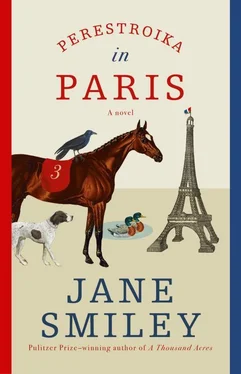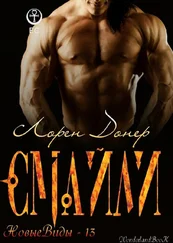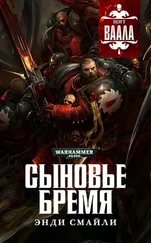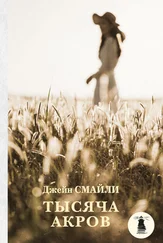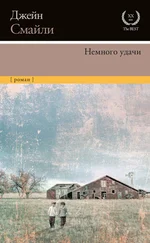Delphine saw at once, the evening of the race, that no one would know what to do with them. Paras was the smallest problem: Could she go back to racing? Would she? The dog needed a home. And the boy—even though some people had suspected he existed, and the authorities were hard at work figuring out his antecedents, no one had a plan. So Delphine let him stay that night in Maisons-Laffitte, with the dog, in a room right above the stall where she put Paras. She saw in the way he looked at Paras and stroked her that he was very attached, so she showed him how to ease out the door and go down the stairs if he wanted to be with her. Early in the morning, she found him in the stall, leaning against Paras, one arm over her back. The dog was lying beside the door of the stall, her head on her paws. And a raven was picking his way sideways along the top of the stall door, cawing, you might say, informatively. Rania brought in the morning bran mash, and Paras got to her feet. The boy stood, yawning. Delphine took him by the hand, said that she had a few rolls and a— And just then she saw the rat, who was sitting in the nearest corner, watching Paras eat from the bucket. Assassin, standing in the doorway of the stall, stared at him, not a single bark. Both Delphine and the boy laughed.
Delphine was happy happy happy. She had called Madeleine, who had fallen out of her chair, she was so thrilled at the news, and would be there later in the day. She hugged Rania, who had made a thousand euros on Whiskey’s win. After the morning feed, she walked that wonderful fellow herself, around and around the courtyard. His legs were cold and perfect, he seemed sound and full of beans. Every so often he turned his head and glanced at Paras eating her hay. Yes, Delphine thought, she is a beauty, and well you should admire her.
It was a lovely morning and a lovely afternoon that would be followed by those events that had to play themselves out, but, Delphine thought, enjoyable all the same.
Madeleine chose to keep Paras in training, at least for now.
After Madeleine left the training center to return to her place near the Parc Monceau, Delphine took Paras out of her stall to walk her around the yard. She saw the boy looking out the window above the stall, and then he came skipping down the stairs and through the doorway. Paras dragged Delphine over to the mounting block, and the boy slid onto her. After a skeptical pause, Delphine handed the boy the lead rope, and he started riding her around the yard. His balance was good. His sense of where Paras might go was good. There was an obvious feeling of attachment between them. Delphine saw that he was doomed to be a horse trainer, shook her head, and suspected that her own mother had once had the same feeling about her.
The authorities came the next day. After nosing about for an hour, they decided to allow the boy to stay with the horse, at least for now: Delphine had space, it was too late in the school year to find a spot for him, and there was no school for the summer. When Delphine took the boy, Étienne Denotre, to pick up his clothing and other possessions, Frida jumped into the car and went along without being asked. As soon as they went through the gate of the property, she ran into the raspberry bushes and dug up the purse. It was deeply brown, damp, fulsome. Inside were two hundred-euro notes. Delphine returned the money to Rania, who told her that two hundred euros was just what she had bet that day on Paras’s race. Rania allowed Frida to keep the purse.
The old lady had a small but lovely funeral, and was buried between her son and her grandson. Étienne stood between Delphine and Rania during the burial, and both of them touched him, held him, comforted him as he cried.
The bank oversaw the cleaning of the house and the disposal of the furnishings, the books, and the extremely healthy crop of mushrooms growing in the cellar. The bank saw no reason to sell the place, at least until the housing market rebounded; when it did rebound, Étienne might inherit a goodly sum. And there was plenty in the old lady’s account. The art collection was sent to an appraiser, who felt that there might be some nice objects among the rest of the junk.
Pierre and Jérôme enjoyed the raspberry crop a great deal, and Pierre carted away the horse manure and dug it into his compost heap.
Delphine bought Frida her own bed, cozy, not too large, which she put inside the tack room, within sight of the door. She always left the door ajar so that Frida could go in and out.
Raoul made himself an excellent nest in the fork of a chestnut tree not far from the training track.
And Kurt was quite taken with Noelle, an agile black rat, a month or so older than he was, whom Assassin had never been able to catch. Their first litter had three pups, two females and a male.
Anaïs and Pierre decided that they were made for each other, and started going to races from time to time as Delphine’s guests.
Paras enjoyed her summer of training. She was only four, after all. Jumpers could go on for years. The American horse Jesse James, whose stall was beside hers, chatted incessantly about his pedigree (his accent was better now). There was one horse—“Independence” was his name—who raced until he was ten, seventy-four starts, two track records. Of course, those days were gone. The American horse snorted, went back to eating his hay. Independence, Paras thought. A wonderful name, a name to remember.
Étienne enjoyed his summer, too. The authorities were patient—they let him get used to the idea of going to school, and they tested him a few times, so surprised were they at what he knew and did not know. Rania said that she would keep him at her house; there was a school around the corner, and she had an empty room. The authorities said that they’d consider her proposal, but they said so in that particular way that indicated they’d already thought it was as good a proposal as any—and, after all, why make things more complicated than they really had to be?
Jane Smiley is the author of numerous novels, including A Thousand Acres, which was awarded the Pulitzer Prize, and, most recently, The Last Hundred Years Trilogy: Some Luck, Early Warning, and Golden Age. She is also the author of several works of nonfiction and books for young adults. A member of the American Academy of Arts and Letters, she has also received the PEN Center USA Lifetime Achievement Award for Literature. She lives in Northern California.
FICTION
The Last Hundred Years Trilogy: Some Luck, Early Warning, Golden Age
Private Life
Ten Days in the Hills
Good Faith
Horse Heaven
The All-True Travels and Adventures of Lidie Newton
Moo
A Thousand Acres
Ordinary Love and Good Will
The Greenlanders
The Age of Grief
Duplicate Keys
At Paradise Gate
Barn Blind
NONFICTION
The Man Who Invented the Computer
Thirteen Ways of Looking at the Novel
A Year at the Races
Charles Dickens
Catskill Crafts FOR YOUNG ADULTS
Gee Whiz
Pie in the Sky
True Blue
A Good Horse
The Georges and the Jewels
Riding Lessons
Saddle and Secrets
Taking the Reins

What’s next on your reading list?
Discover your next great read!
________
Get personalized book picks and up-to-date news about this author.
Sign up now.
Читать дальше
